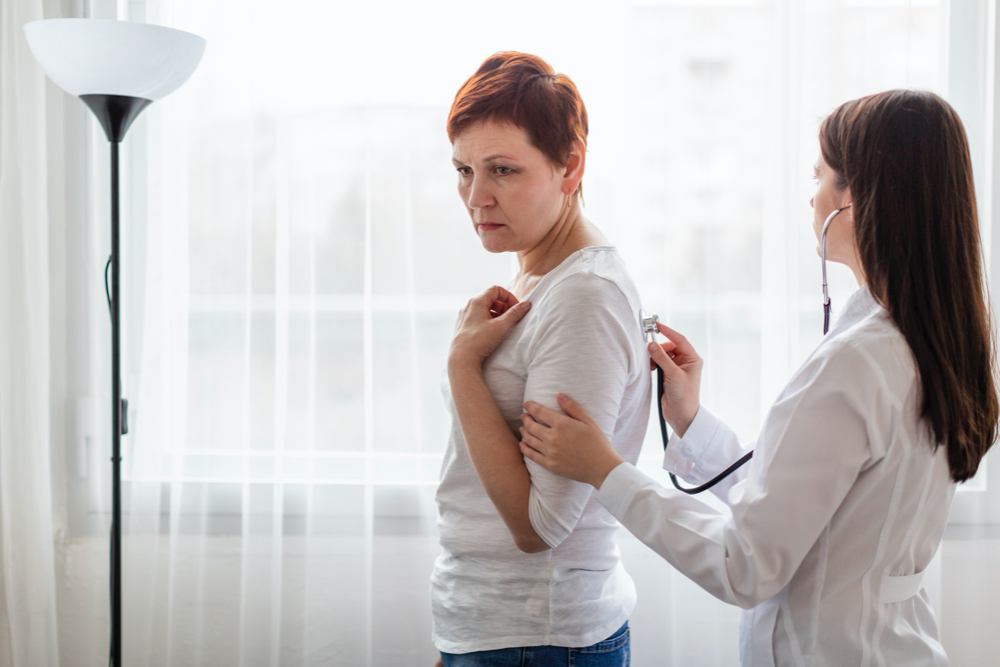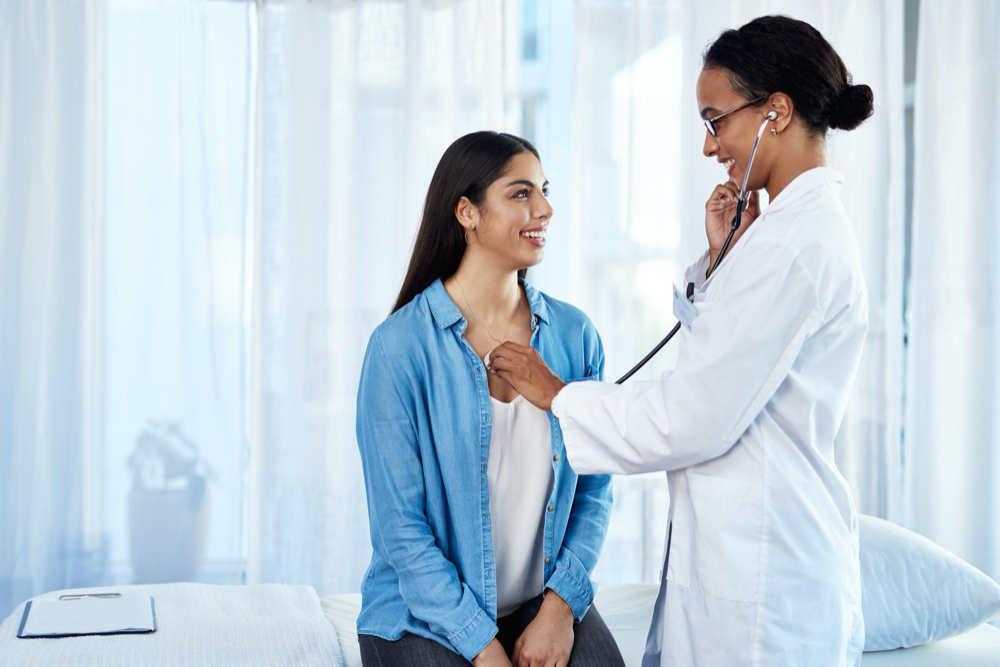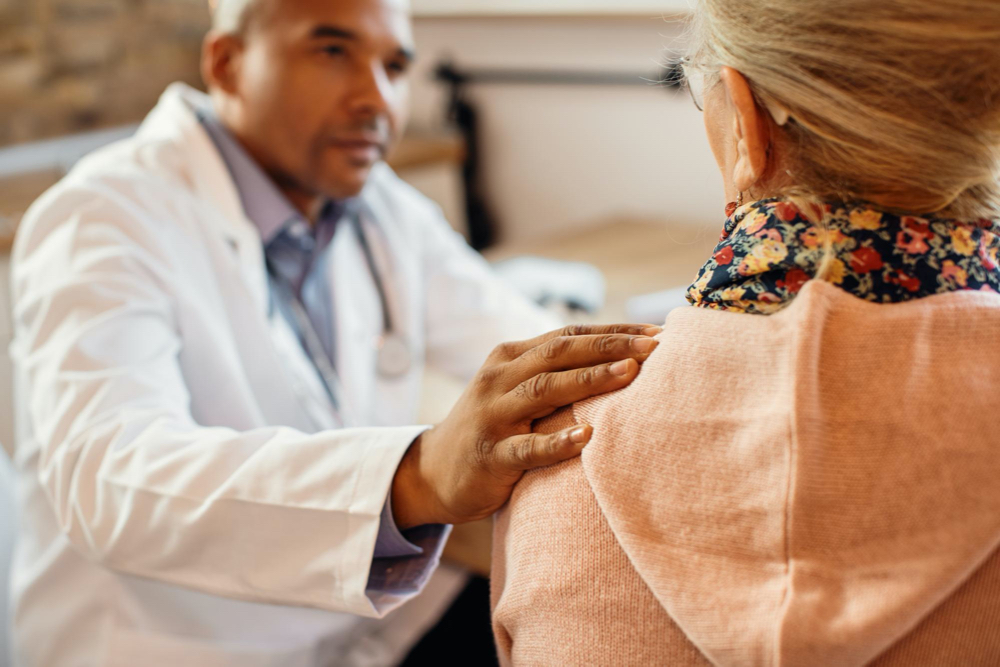- Fast results
- 4,000+ locations
- 4.8 star rating
Need Help? (888) GET LABS


Breast cancer retains its reputation as the most common cancer for women and, in general, for all forms –which is why it’s crucial to understand how this condition develops and the preventive measures to minimize your risk. In this guide, we present the ten ways to lower breast cancer risk, including scientific evidence to back them up. See how these practices can help protect you from this fatal condition.
Breast cancer risk can be decreased by maintaining a healthy weight. According to research and emerging evidence, obesity has a direct association with breast cancer. Obese premenopausal women have reduced estrogen circulation and increased cases of amenorrhea (lack of menstruation). However, after menopause, the relationship between obesity and estrogen changes as it contributes to the increase of estrogen receptors, which the cancer cell can use for growth.
In addition, adipose (fat) tissues also promote estrogen production. Plus, obesity often also comes with insulin resistance that forces the pancreas to release abnormally high levels, yet typically unused, insulin. This greatly contributes to the development of type 2 diabetes, a critical trigger for cancer, including breast.
With these impacts of obesity on breast cancer risk and overall health, weight management becomes even more imperative, especially if you are about to hit menopause. That said, make sure to check your body mass index (BMI) regularly to see if you’re crossing the boundary from normal to overweight.
Also, be more conscious of your diet and regular activity. Avoid a sedentary lifestyle and follow a proper weight loss regime, including acquiring your basic weight loss health profile before engaging in any program.
| Pro tip: Many women targeting weight loss experience the yo-yo effect, wherein they tend to achieve their weight goals at the beginning, only to regain the lost weight eventually. To avoid yoyoing when managing your health, check out our guide on weight loss barriers and how to handle them the right way. |
Maintaining good health often requires a holistic diet with crucial nutrients and less fat, sugar, and sodium. However, as part of your efforts to lower breast cancer risk, you can go the extra mile by adopting a healthy plant-based diet consisting of fruits, leafy vegetables, whole grains, legumes, and nuts.
A study published in Nutrients underscored how healthful plant-based diets reduce the risk of breast cancer development, recurrence, and mortality. Furthermore, it reduces a similar risk for non-breast-cancer deaths. In contrast, the study also concluded that an unhealthful diet, which includes starchy foods, fruit juices, and refined grains, may increase health risks, including breast cancer formation.
| Pro tip: Shifting to a plant-based diet, whether it’s vegetarian or vegan, shouldn’t be done cold turkey. For example, you may subject yourself to certain health risks when switching to a vegan diet, such as vitamin deficiencies. With that in mind, learn about the essential things you need to know before going vegan. |
Physical activity, especially regular exercise, is critical for weight management, which is essential to lower your breast cancer risk. But aside from preventing obesity and weight-related issues, exercise also reduces hormone production, specifically excessive ones like estrogen.
Additionally, it’s noted that the impact of regular exercise in lowering the breast cancer risk goes as early as before menopause–with about 12% to 21% reduced risk compared to those who are inactive.
If you are primarily sedentary, start incorporating regular exercise into your routine. You can do light physical activities at home, revisit a sport you love, or visit the gym once or twice a week.
Tobacco products are known to contain carcinogens or chemicals that can trigger cancer. Therefore, it’s no surprise that a key step in lowering your risk of breast cancer is giving up smoking.
A recent systematic review outlines how smoking increases the risk of developing breast cancer. In this study, it was highlighted that the degree of likelihood of having the condition depends on the quantity, frequency, and years of quitting, along with other factors.
Quitting smoking generally upgrades your health. Not only does it lower your breast cancer risk, but it also extends your longevity, as smoking significantly reduces life expectancy. Keep in mind, however, that eliminating smoking from your habits comes with challenges, as withdrawal symptoms can impede your day-to-day life for a certain time period.
| Did You Know? Programs that monitor individuals trying to quit cigarette use can impose a blood test for smoking. This lab work can analyze the amount of nicotine in your system, providing insights into how long you will have to counteract withdrawal symptoms. Such test help people avoid common mistakes when giving up smoking. |
Consuming excessive amounts of alcohol increases the risk of breast cancer, and any cancer for that matter. In fact, research suggests that 4% of cancers worldwide are triggered by drinking too much alcohol. Non-drinkers are also noted to have a lower breast cancer risk than those who consume 2 to 3 alcoholic beverages daily.
Therefore, alcohol consumption should be regulated, if not eliminated. Despite the argument that alcohol has health benefits in lowering the risk of cardiovascular diseases and type 2 diabetes, it is essential to remember that other factors are also at play. To better understand how alcohol truly impacts your health, consult your doctor.
Another renowned carcinogen to look out for is ionizing radiation. According to a study published in the Archives of Toxicology, ionizing radiation can increase breast cancer risk in many ways, including DNA damage, increased production of reactive oxygen and nitrogen species (ROS) that trigger cancer cell proliferation, and disruption in the hormonal balance. Ionizing radiation impacts young women, most especially those exposed earlier.
Common sources of ionizing radiation, such as medical imaging machines, radioactive materials, and radon gas, aren’t exactly exposed to the public. Individuals who work in specific industries where these materials are prevalent are, however, disadvantaged.
But while ionizing radiation is hazardous, it’s important to remember that cancer risk will also depend on the intensity and duration of exposure. Hence, you can still keep yourself safe by following a strict safety protocol in your workplace.
Breastfeeding has been promoted among mothers for its numerous health benefits–most notably in the development of the baby. For mothers, studies suggest that breastfeeding decreases pre and post-menopausal breast cancer, especially for a relatively long time. Therefore, breastfeeding women are encouraged to continue with lactation until two years or beyond.
In cases where breastfeeding is proven to be a challenge, ask your doctor for advice and continue practicing the other tips in this list. Keep in mind that breast cancer risk reduction involves not just a single action but a combination of multiple habits and lifestyle adjustments.
Oral contraceptives, particularly those containing estrogen and progesterone, can increase your vulnerability to breast cancer. A study published in the New England Journal of Medicine showed evidence that women using contemporary hormonal contraceptives are at a higher risk of developing breast cancer than non-users. The figures are significant, even though it was only a slight increase.
If you already have a higher risk of breast cancer due to genetic disposition, it’s sensible to consider other contraceptives apart from hormonal oral types. However, if these pills also play another role in your reproductive health, ask your doctor if the slight risk increase is negligible for your case.
During perimenopause and menopause, women should also be cautious when undergoing hormone replacement therapy (HRT). According to Cancer Epidemiology, Biomarkers, and Prevention, there is a direct relationship between HRT use and increased breast cancer risk. Individual factors, such as breast density and body weight, affect susceptibility levels.
With this information in mind, it’s safe to say that HRT is not entirely a trigger for breast cancer. So, to better understand your body’s potential reaction to the therapy, make sure to work closely with your doctor and seek professional advice on how to prepare your body for menopause.
There are drugs that can help lower your risk of breast cancer by blocking or reducing estrogen in the breast cells. As established above, estrogen can promote the growth of cancer cells. Hence, if you have a significantly higher susceptibility to developing cancer, this could be a potential route. Some of the most popular forms of this drug are raloxifene and tamoxifen, as well as aromatase inhibitors like exemestane and anastrozole.
However, breast cancer risk-lowering drugs should be recommended by a healthcare professional as an initial assessment of your family history and overall vulnerability to the condition is necessary. You may have to undergo breast cancer lab tests and further monitoring of symptoms.

Individualized breast cancer risk assessment often increases your chances of detecting potential development and/or early intervention for better treatment and recovery. To avail of this process, you have to consult your healthcare provider or gynecologist. These professionals will look closely into your family history of cancer, possible exposure to sources of genetic mutations, breast density, personal history of cancerous and non-cancerous health problems, and lifestyle factors.

A lump or mass is often the first sign of possible breast cancer. However, keep in mind that not all lumps are cancerous or malignant; others are benign. But that is not to say they shouldn’t be addressed, as unchecked benign masses also increase your risk of breast cancer.
You can check for lumps by performing breast self-examination, wherein you feel any unusual mass forming in your breast and abnormal changes in the size, skin, and nipples. Other possible indications of breast cancer include abnormal peeling, thickening, or scaling, redness in the skin, and flaking in the areola area. You could also observe sudden retraction of the nipple, unusual discharge, breast puckering, and numbing.
If you have these odd physical changes in your breasts, it’s imperative to seek immediate medical attention. Your doctor may have to perform or request a mammogram or other breast cancer lab tests to aid in the diagnosis.

While food alone can’t prevent breast cancer, certain types can increase protection and reduce your risk. These include leafy vegetables and cruciferous vegetables like broccoli, cauliflower, and Brussels sprouts. You can also have citrus fruits, pears, berries, grapes, and apples. Look for food sources high in antioxidants, as they have the capacity to negate oxidative stress, which is a known trigger for cancer development.
Available treatment for breast cancer typically targets the mutated cells in the mammary area. For example, chemotherapy kills cancer cells by halting cells that divide uncontrollably in the breast through various mechanisms, like destroying the DNA or impeding its metabolism. Photodynamic therapy, on the other hand, uses light to inflict significant damage to cancer cells.
Breast health ultimately depends on how you take care of your overall well-being. Hence, keeping your breast healthy means keeping a normal weight, eating healthy foods, exercising regularly, and protecting yourself from carcinogens like cigarettes and excess alcohol. It also means regularly checking your breasts for lumps and unusual activities that could suggest issues. Then, responding, consulting your doctor for proper diagnosis and early intervention.
Breast cancer may not be completely prevented in certain cases, but you can lower your risk by employing proper lifestyle adjustments and health-forward actions. It is a common misconception that breast cancer mainly impacts women nearing or have gone through menopause. However, in reality, young women aged 45 and below can also become susceptible. For this reason, paying more attention to your health is essential, even if you’re far from menopause.

© Copyright 2024 Personalabs. All Rights Reserved.

We now offer pharmacy discounts through our PersonalabsRx platform.
We now offer pharmacy discounts through our PersonalabsRx platform.